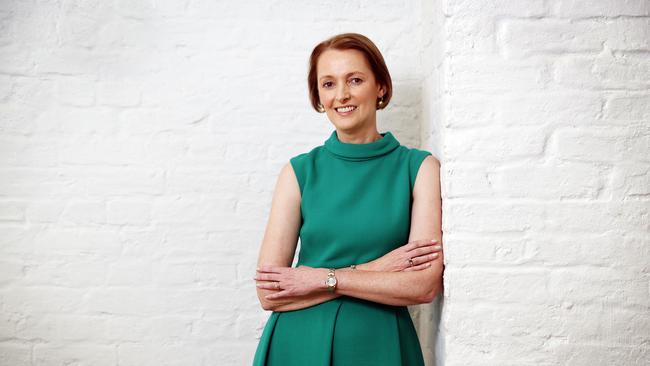Working from home here to stay in some way for big employers
From banks to supermarkets, miners and tech, work from home policies have shifted. Here’s what some of the biggest workplaces are now requiring.
Business
Don't miss out on the headlines from Business. Followed categories will be added to My News.
More than 20 of Australia’s biggest employers - from the big banks and insurers to supermarket chains and miners - have adopted work from home policies permanently, heralding the biggest workplace shift in a decade.
But chief executives are tightening the practice amid flatlining productivity and increasing sensitivity that hybrid working is considered a perk for those in corporate offices.
This is particularly the case at companies where the majority of the workforce needs to be onsite and working from home is not an option.
A survey by The Weekend Australian of the nation’s biggest employers has revealed that most companies have set policies that require staff to attend the office at least two to three days a week. Others, such as Telstra and Medibank, have no such mandates.
Hybrid working has become one of the most sought after workplace conditions - even trumping salary - and employers have been quick to acquiesce after Australia’s unemployment rate sank to a 30-year low.
But as the jobless rate begins to creep up again - rising from 3.5 to 3.7 per cent last month - the bargaining power is swinging back more to employers.
NAB chief executive Ross McEwan ordered his senior leaders back into the office five days a week in April, while Crown Resorts boss Ciaran Carruthers says working from home is driving away tourists with Australia’s capital cities lacking vibrancy from Fridays to Tuesdays.
Other companies such as software giant WiseTech Global are leaving it up to employees and their managers to determine where they work, with key projects the deciding factor.

Almost half of Australia’s workforce switched to working from home during the height of the pandemic, compared with about 5 per cent before Covid-19 struck in early 2020.
Leading demographer Bernard Salt expects that number to settle to 10-15 per cent. But the transition will not be easy as many employees have made big lifestyle decisions such as moving from near CBDs to regional areas, believing working from home would become the new normal.
“This is going to cause a great deal of anxiety at the board, senior management and team level and staff level,” Mr Salt said.
“This has some way to play out yet. This is a five-year event, which is the same as WWII. It is a major global event equivalent to the war in terms of timeframe.”
Mr Salt expects working from home will become more normal for people aged in their mid-to-late 30s to 50s, who have the networks and expertise to work away from the office and perform tasks that are clearly measurable.
“But if you’re a corporate worker in your early 20s or 30s who hasn’t built up that expertise or network… they’ll be more likely part of that 25 per cent that will have to shift back to the workplace.”
Career progression is one of the biggest factors in returning to the office more. David Elia, chief executive of the hospitality workers union Hostplus, said that if you’re “invisible” working from home “you are less likely to receive the same level of investment in professional development and training as someone who is visible”.

But the push for more workers to return to the office has implications to the gender pay gap. Work from home policies have also allowed more mothers to stay in the workforce, with hybrid working enabling them to share child rearing such as school drop off and pick ups with their partners.
But as employers tighten the practice and work routines return to normal, the bulk of child caring duties is falling back to female parents. According to The Demographics Group, 50.4 per cent of mothers with a full time job are working from home compared with 31.7 per cent of fathers.
Executives will have to grapple with that as part of the heightened focus on environment, social and governance obligations amid the call for more workers to return to the office.
Ross McEwan recognises there is need for flexibility across the broader workforce, despite having a five-day-a-week mandate for his senior leaders.

“Flexibility is also important and the vast majority of our colleagues are required to be in the office a minimum of two or three days,” Mr McEwan said.
“However, at the same time, we need to make sure we’re training and developing our colleagues effectively and regularly collaborating and problem solving for our customers.
“We need to train and develop our teams to be the best they can in supporting our customers and colleagues. This is hard to do when you don’t have a leader beside you, which is why I’ve asked our most senior leaders back into the office five days a week.”
Sarah Gordon from ReithGordon Executive Search & Recruitment said seeking clarity on a company’s hybrid work policy was one of the No.1 questions most candidates asked before entering a recruitment process.
“It remains a very competitive talent market and employees are confident to ask for what they want and challenge traditional workplace norms. Flexible working is the first or second question we’re asked when briefing candidates on role,” Ms Gordon said.
“We’ve been upfront with hiring managers in relation to the diminished size and calibre of the talent pool available to them if they’re unwilling to offer and genuinely support flexible work. This is broadly accepted now but it will be interesting to see if softer economic conditions have an impact.”
Indeed, Ms Gordon said that while employees have held the balance of power for much of the past three years, in recent months that “appears to be shifting to a more neutral position”.

CSL chief financial officer Joy Linton said she knows “people highly value flexible working arrangements”.
“This is particularly important for those who need to meet with their colleagues around the world outside of standard business hours,” Ms Linton said.
“However, we think it is important to balance the in-person connection that comes with being in the office environment, and taking time at home to complete focussed work.”
Perth-based mining and metals giant South32 says: “Our view is that there simply isn’t a one-size-fits-all approach” in regard to hybrid working.
“Bringing people together in our offices creates good opportunities for growth, learning and collaboration and a sense of connectedness,” a South32 spokesman said.
“Covid-19 demonstrated that we can also achieve great outcomes with our people working remotely. The key is finding and facilitating the balance of what works for each individual, their role, and the business.”
Rio Tinto even adopted flexible working before the pandemic, given the amount of travel staff do between mining sites and offices.
“Obviously, much of our work needs to be done on site. In jobs that allow it, our people decide with their leaders the most effective way of working in the office and at home,” a Rio Tinto spokesman said.
But he said there was a “growing acknowledgement of the real benefits of a certain amount of face-to-face contact and collaboration with colleagues, following years of Covid restrictions.”
Other companies that have adopted hybrid working policies include CBA and ANZ, which have a 50/50 split between home and the office, BHP, plumbing giant Reece, Auckland Airport, Transurban, IAG, Cochlear, Brambles, REA Group, APA Group, Xero, Coles, Woolworths, Aristocrat and Goodman.
Originally published as Working from home here to stay in some way for big employers





